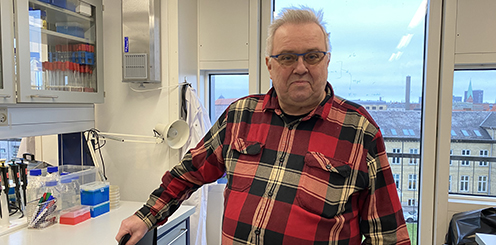Jubilarian of great importance to the Danish dairy industry
On 1 March 2020, Associate Professor Finn Kvist Vogensen will have been employed at the Department of Food Science at the University of Copenhagen (UCPH FOOD) for 40 years. He has spent four decades acquiring knowledge that has helped dairies to develop more efficient and safer cheese production.

In 1980, UCPH FOOD was part of the Royal Veterinary and Agricultural University, and Finn Kvist Vogensen began work as a licentiate student (a PhD student) in the university’s Dairy Laboratory. Six months later, his study supervisor chose to work in the industry, and thus the road was paved for Finn, who took over his supervisor’s teaching. Apart from three years, he has taught ever since. He has therefore had a hand in the education of the vast majority of active dairy engineers in Denmark.
Throughout this period, Finn has been engaged both scientifically and educationally with dairy microbiology and starter cultures. His primary research focus has been lactic acid bacteria and their properties, and from the beginning he has been a central figure in the introduction of molecular methods into traditional dairy microbiology. At the same time, his extensive knowledge of the challenges of the dairy industry has led him always to concentrate on solving practical problems. The research area is broad and encompasses physiology, aroma formation, biodiversity, etc. One special area of interest is the interaction between starter cultures and viruses that attack bacteria, so-called bacteriophages. Finn has studied the properties that enable phages to attack bacterial strains.
In the past, phage attacks on cheese cultures were often discovered too late, which resulted in large quantities of poor quality cheese. Finn has helped dairies to prevent this during his long career at UCPH FOOD. Today he is working, among other things, on developing a monitoring system that can detect very early signs of problems with a starter culture. His extensive knowledge of bacteriophages has also helped support a host of other activities, where bacteriophages are actively used to change the intestinal flora/microbiome in order to treat or prevent disease.
When Finn started working on bacteriophages, very little international attention was being given to the subject, and he could count his colleagues on two hands. Today, many more have become aware of the great importance of bacteriophages to the dynamics of microbial communities, and Finn has a large network of collaborators around the world.
Topics
Related News
Contact
Associated Professor Finn Kvist Vogensen, Department of Food Science at the University of Copenhagen (UCPH FOOD), fkv@food.ku.dk
Professor Susanne Knøchel, UCPH FOOD, skn@food.ku.dk
Communications Officer Lene Hundborg Koss, UCPH FOOD, lene.h.koss@food.ku.dk
Bacteriophages
Research into bacteriophages is of great importance in the dairy sector. Bacteriophages are viruses that selectively attack certain bacteria, including the bacteria used for fermentation. It is therefore essential to keep at a low level the phages that attack starter cultures. But in other contexts, bacteriophages can be beneficial, and they are used in a targeted manner to break down certain bacteria.
